Vocational Education & Training: Improved Learning Practice Analysis
VerifiedAdded on 2023/06/10
|8
|1909
|479
Report
AI Summary
This report provides an overview of contemporary adult learning practices and best-practice pedagogical approaches in vocational education and training. It delves into learning theories such as behaviorism, cognitivism, and constructivism, and explores various learner styles including pragmatic, activist, reflective, kinesthetic, audio, and visual learners. The report also describes different training techniques like instruction, questioning, practice, written information, group activities, individual activities, and demonstration. Furthermore, it discusses the management of learning content and objects to promote engagement, emphasizing the importance of planning e-learning courses and adopting tools that identify individual learning abilities to provide a better learning experience. Desklib offers a platform to explore more such solved assignments and learning materials.
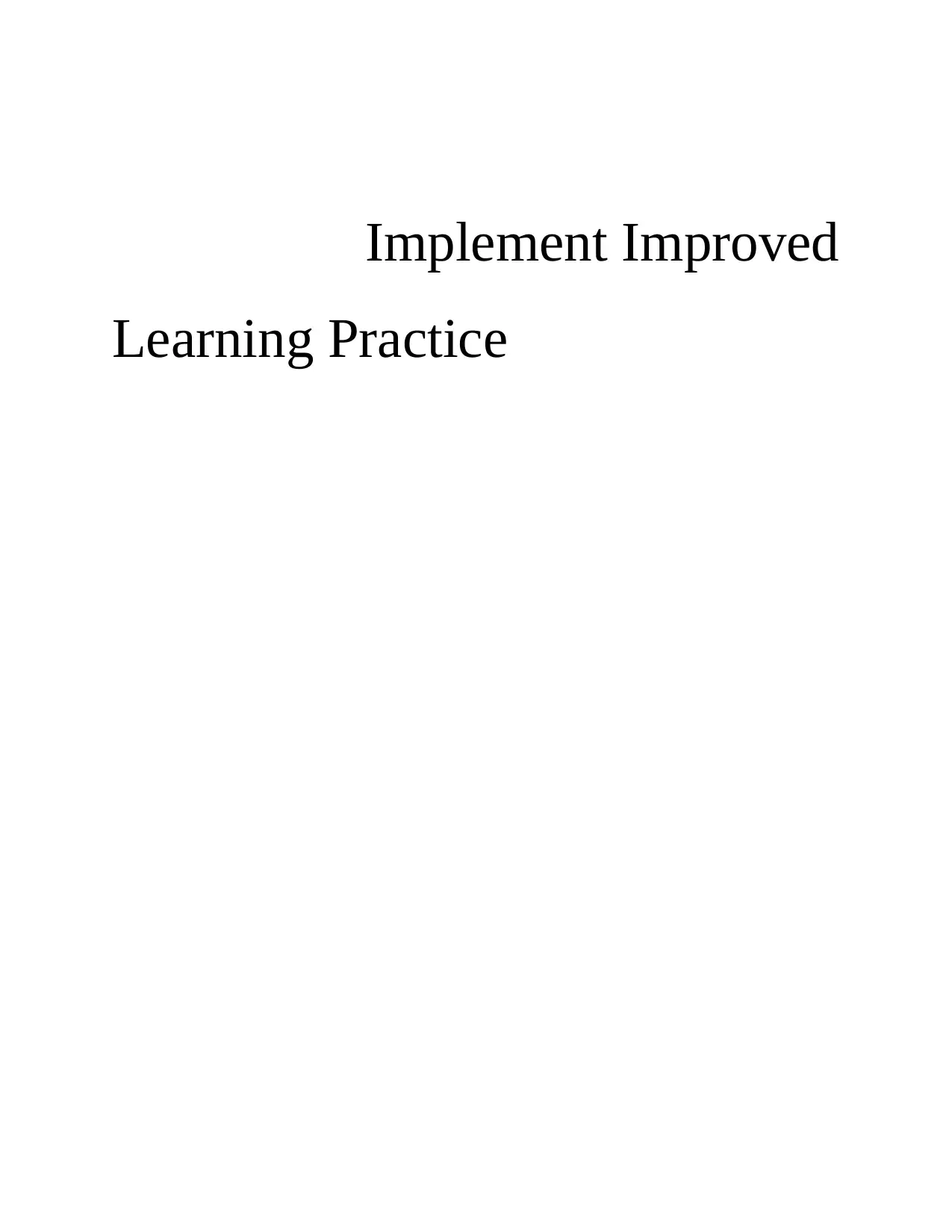
Implement Improved
Learning Practice
Learning Practice
Paraphrase This Document
Need a fresh take? Get an instant paraphrase of this document with our AI Paraphraser
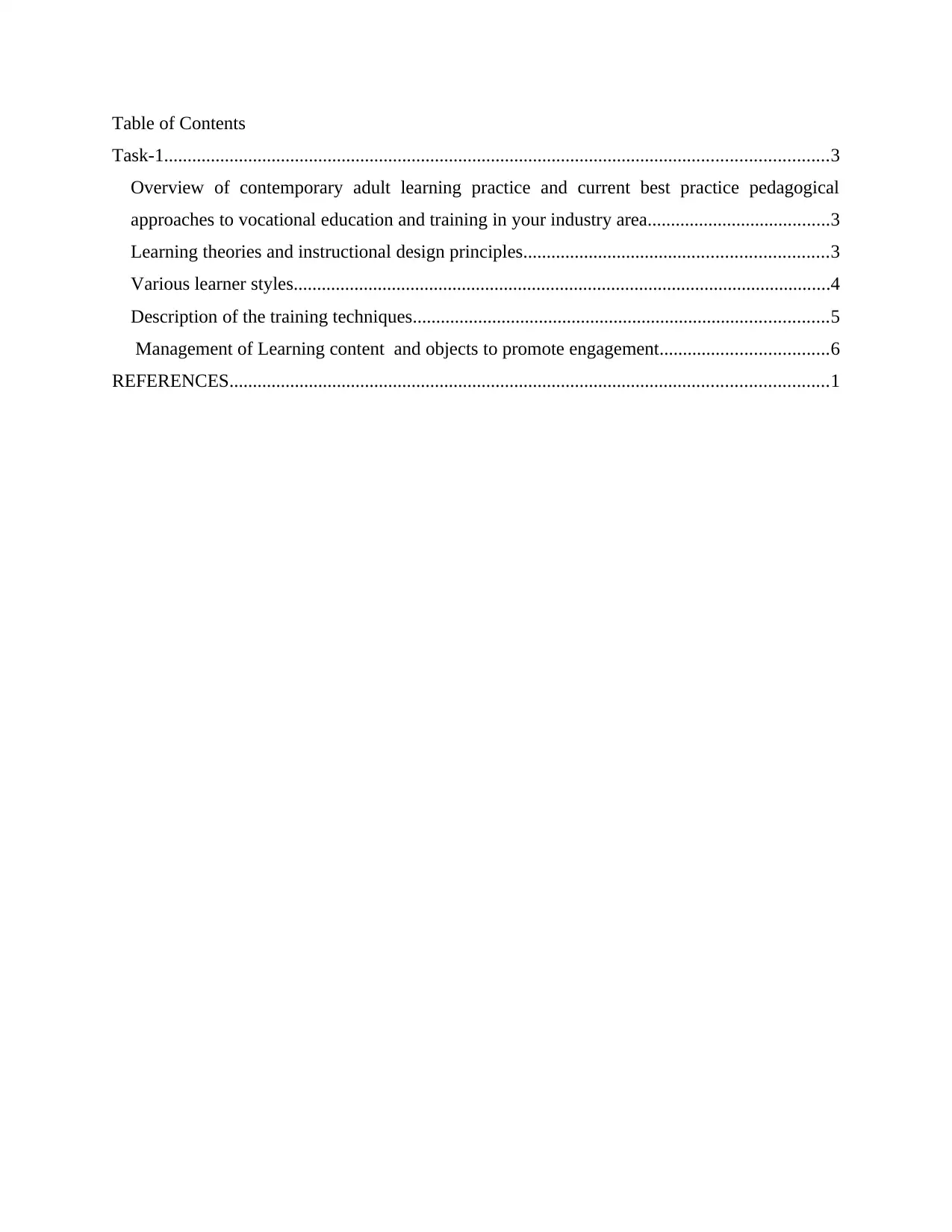
Table of Contents
Task-1..............................................................................................................................................3
Overview of contemporary adult learning practice and current best practice pedagogical
approaches to vocational education and training in your industry area.......................................3
Learning theories and instructional design principles.................................................................3
Various learner styles...................................................................................................................4
Description of the training techniques.........................................................................................5
Management of Learning content and objects to promote engagement....................................6
REFERENCES................................................................................................................................1
Task-1..............................................................................................................................................3
Overview of contemporary adult learning practice and current best practice pedagogical
approaches to vocational education and training in your industry area.......................................3
Learning theories and instructional design principles.................................................................3
Various learner styles...................................................................................................................4
Description of the training techniques.........................................................................................5
Management of Learning content and objects to promote engagement....................................6
REFERENCES................................................................................................................................1
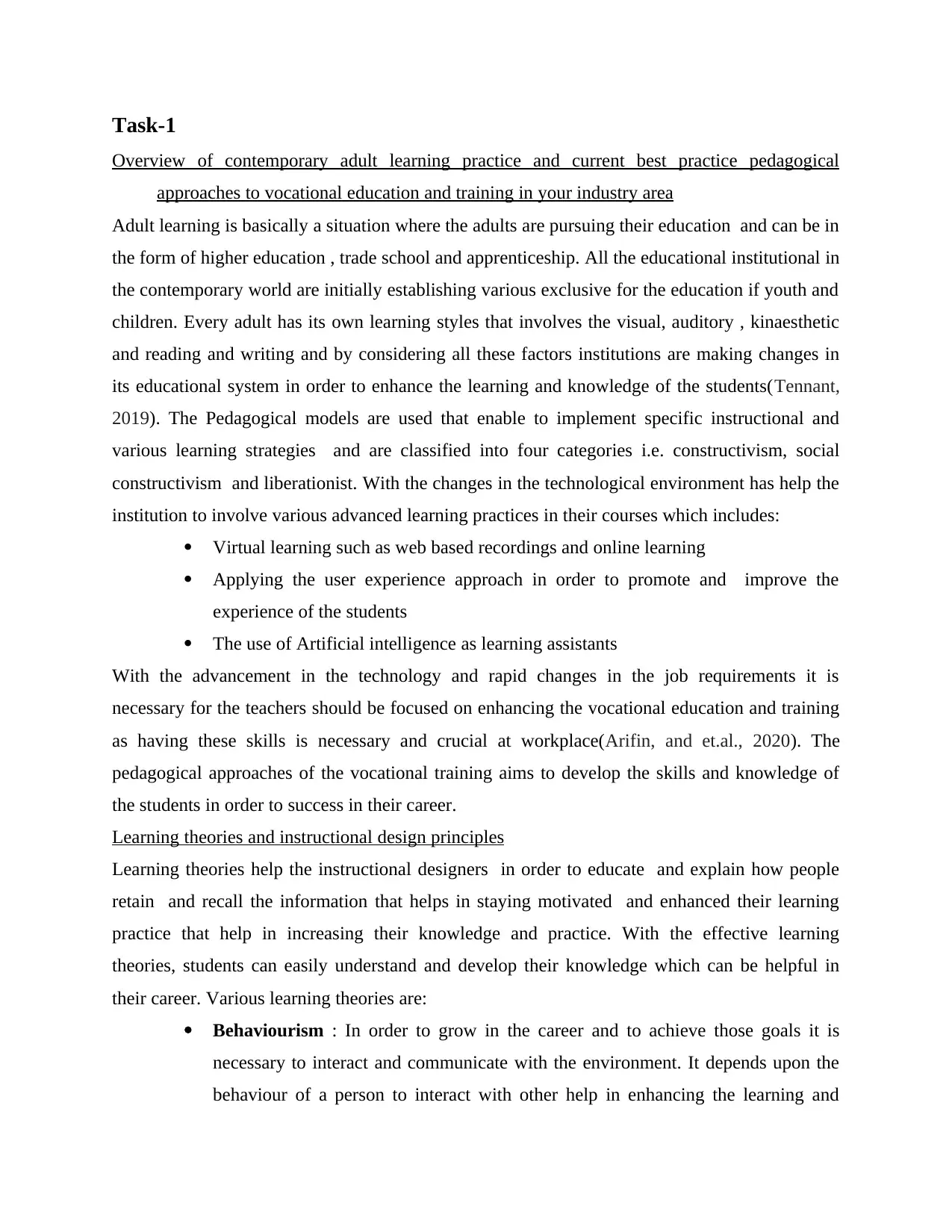
Task-1
Overview of contemporary adult learning practice and current best practice pedagogical
approaches to vocational education and training in your industry area
Adult learning is basically a situation where the adults are pursuing their education and can be in
the form of higher education , trade school and apprenticeship. All the educational institutional in
the contemporary world are initially establishing various exclusive for the education if youth and
children. Every adult has its own learning styles that involves the visual, auditory , kinaesthetic
and reading and writing and by considering all these factors institutions are making changes in
its educational system in order to enhance the learning and knowledge of the students(Tennant,
2019). The Pedagogical models are used that enable to implement specific instructional and
various learning strategies and are classified into four categories i.e. constructivism, social
constructivism and liberationist. With the changes in the technological environment has help the
institution to involve various advanced learning practices in their courses which includes:
Virtual learning such as web based recordings and online learning
Applying the user experience approach in order to promote and improve the
experience of the students
The use of Artificial intelligence as learning assistants
With the advancement in the technology and rapid changes in the job requirements it is
necessary for the teachers should be focused on enhancing the vocational education and training
as having these skills is necessary and crucial at workplace(Arifin, and et.al., 2020). The
pedagogical approaches of the vocational training aims to develop the skills and knowledge of
the students in order to success in their career.
Learning theories and instructional design principles
Learning theories help the instructional designers in order to educate and explain how people
retain and recall the information that helps in staying motivated and enhanced their learning
practice that help in increasing their knowledge and practice. With the effective learning
theories, students can easily understand and develop their knowledge which can be helpful in
their career. Various learning theories are:
Behaviourism : In order to grow in the career and to achieve those goals it is
necessary to interact and communicate with the environment. It depends upon the
behaviour of a person to interact with other help in enhancing the learning and
Overview of contemporary adult learning practice and current best practice pedagogical
approaches to vocational education and training in your industry area
Adult learning is basically a situation where the adults are pursuing their education and can be in
the form of higher education , trade school and apprenticeship. All the educational institutional in
the contemporary world are initially establishing various exclusive for the education if youth and
children. Every adult has its own learning styles that involves the visual, auditory , kinaesthetic
and reading and writing and by considering all these factors institutions are making changes in
its educational system in order to enhance the learning and knowledge of the students(Tennant,
2019). The Pedagogical models are used that enable to implement specific instructional and
various learning strategies and are classified into four categories i.e. constructivism, social
constructivism and liberationist. With the changes in the technological environment has help the
institution to involve various advanced learning practices in their courses which includes:
Virtual learning such as web based recordings and online learning
Applying the user experience approach in order to promote and improve the
experience of the students
The use of Artificial intelligence as learning assistants
With the advancement in the technology and rapid changes in the job requirements it is
necessary for the teachers should be focused on enhancing the vocational education and training
as having these skills is necessary and crucial at workplace(Arifin, and et.al., 2020). The
pedagogical approaches of the vocational training aims to develop the skills and knowledge of
the students in order to success in their career.
Learning theories and instructional design principles
Learning theories help the instructional designers in order to educate and explain how people
retain and recall the information that helps in staying motivated and enhanced their learning
practice that help in increasing their knowledge and practice. With the effective learning
theories, students can easily understand and develop their knowledge which can be helpful in
their career. Various learning theories are:
Behaviourism : In order to grow in the career and to achieve those goals it is
necessary to interact and communicate with the environment. It depends upon the
behaviour of a person to interact with other help in enhancing the learning and
⊘ This is a preview!⊘
Do you want full access?
Subscribe today to unlock all pages.

Trusted by 1+ million students worldwide
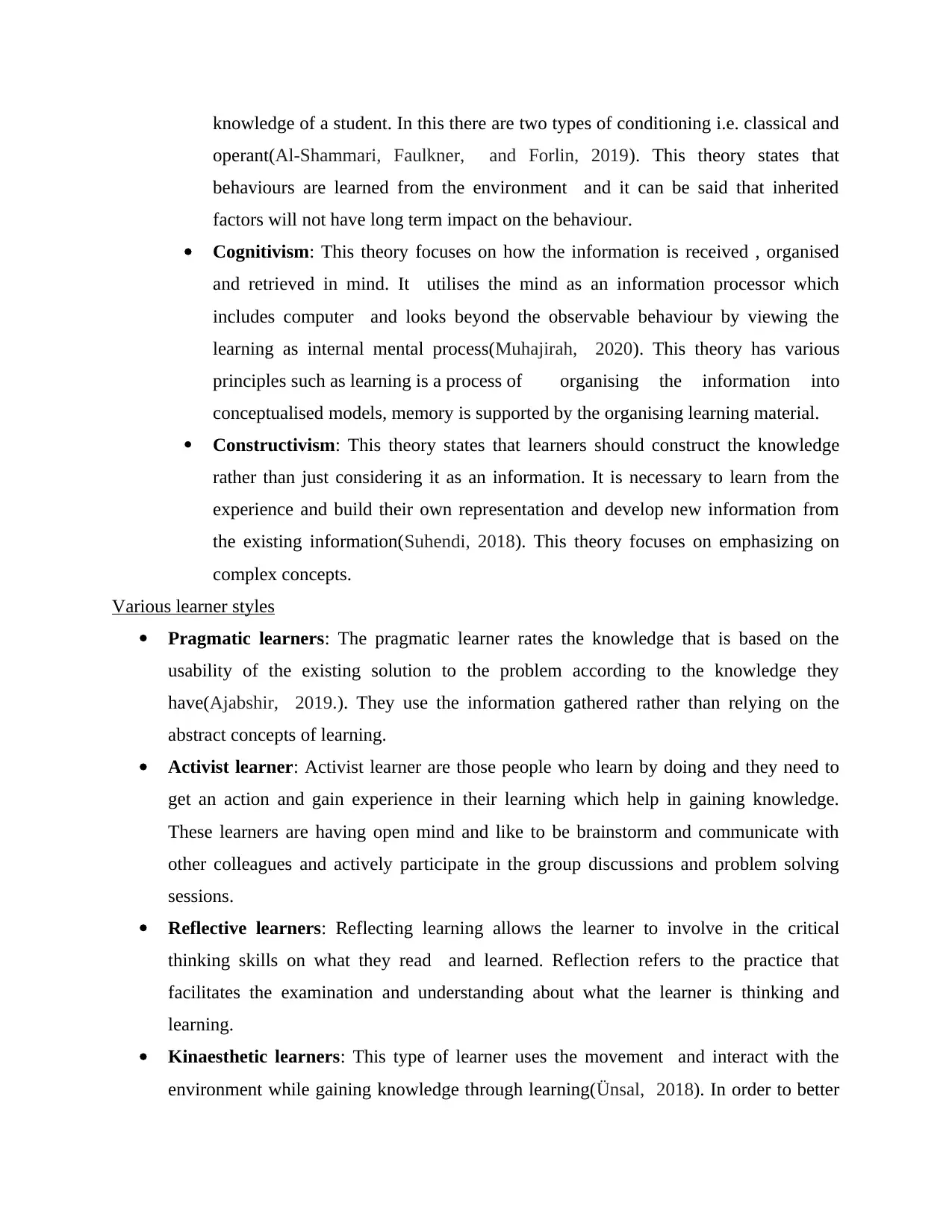
knowledge of a student. In this there are two types of conditioning i.e. classical and
operant(Al-Shammari, Faulkner, and Forlin, 2019). This theory states that
behaviours are learned from the environment and it can be said that inherited
factors will not have long term impact on the behaviour.
Cognitivism: This theory focuses on how the information is received , organised
and retrieved in mind. It utilises the mind as an information processor which
includes computer and looks beyond the observable behaviour by viewing the
learning as internal mental process(Muhajirah, 2020). This theory has various
principles such as learning is a process of organising the information into
conceptualised models, memory is supported by the organising learning material.
Constructivism: This theory states that learners should construct the knowledge
rather than just considering it as an information. It is necessary to learn from the
experience and build their own representation and develop new information from
the existing information(Suhendi, 2018). This theory focuses on emphasizing on
complex concepts.
Various learner styles
Pragmatic learners: The pragmatic learner rates the knowledge that is based on the
usability of the existing solution to the problem according to the knowledge they
have(Ajabshir, 2019.). They use the information gathered rather than relying on the
abstract concepts of learning.
Activist learner: Activist learner are those people who learn by doing and they need to
get an action and gain experience in their learning which help in gaining knowledge.
These learners are having open mind and like to be brainstorm and communicate with
other colleagues and actively participate in the group discussions and problem solving
sessions.
Reflective learners: Reflecting learning allows the learner to involve in the critical
thinking skills on what they read and learned. Reflection refers to the practice that
facilitates the examination and understanding about what the learner is thinking and
learning.
Kinaesthetic learners: This type of learner uses the movement and interact with the
environment while gaining knowledge through learning(Ünsal, 2018). In order to better
operant(Al-Shammari, Faulkner, and Forlin, 2019). This theory states that
behaviours are learned from the environment and it can be said that inherited
factors will not have long term impact on the behaviour.
Cognitivism: This theory focuses on how the information is received , organised
and retrieved in mind. It utilises the mind as an information processor which
includes computer and looks beyond the observable behaviour by viewing the
learning as internal mental process(Muhajirah, 2020). This theory has various
principles such as learning is a process of organising the information into
conceptualised models, memory is supported by the organising learning material.
Constructivism: This theory states that learners should construct the knowledge
rather than just considering it as an information. It is necessary to learn from the
experience and build their own representation and develop new information from
the existing information(Suhendi, 2018). This theory focuses on emphasizing on
complex concepts.
Various learner styles
Pragmatic learners: The pragmatic learner rates the knowledge that is based on the
usability of the existing solution to the problem according to the knowledge they
have(Ajabshir, 2019.). They use the information gathered rather than relying on the
abstract concepts of learning.
Activist learner: Activist learner are those people who learn by doing and they need to
get an action and gain experience in their learning which help in gaining knowledge.
These learners are having open mind and like to be brainstorm and communicate with
other colleagues and actively participate in the group discussions and problem solving
sessions.
Reflective learners: Reflecting learning allows the learner to involve in the critical
thinking skills on what they read and learned. Reflection refers to the practice that
facilitates the examination and understanding about what the learner is thinking and
learning.
Kinaesthetic learners: This type of learner uses the movement and interact with the
environment while gaining knowledge through learning(Ünsal, 2018). In order to better
Paraphrase This Document
Need a fresh take? Get an instant paraphrase of this document with our AI Paraphraser
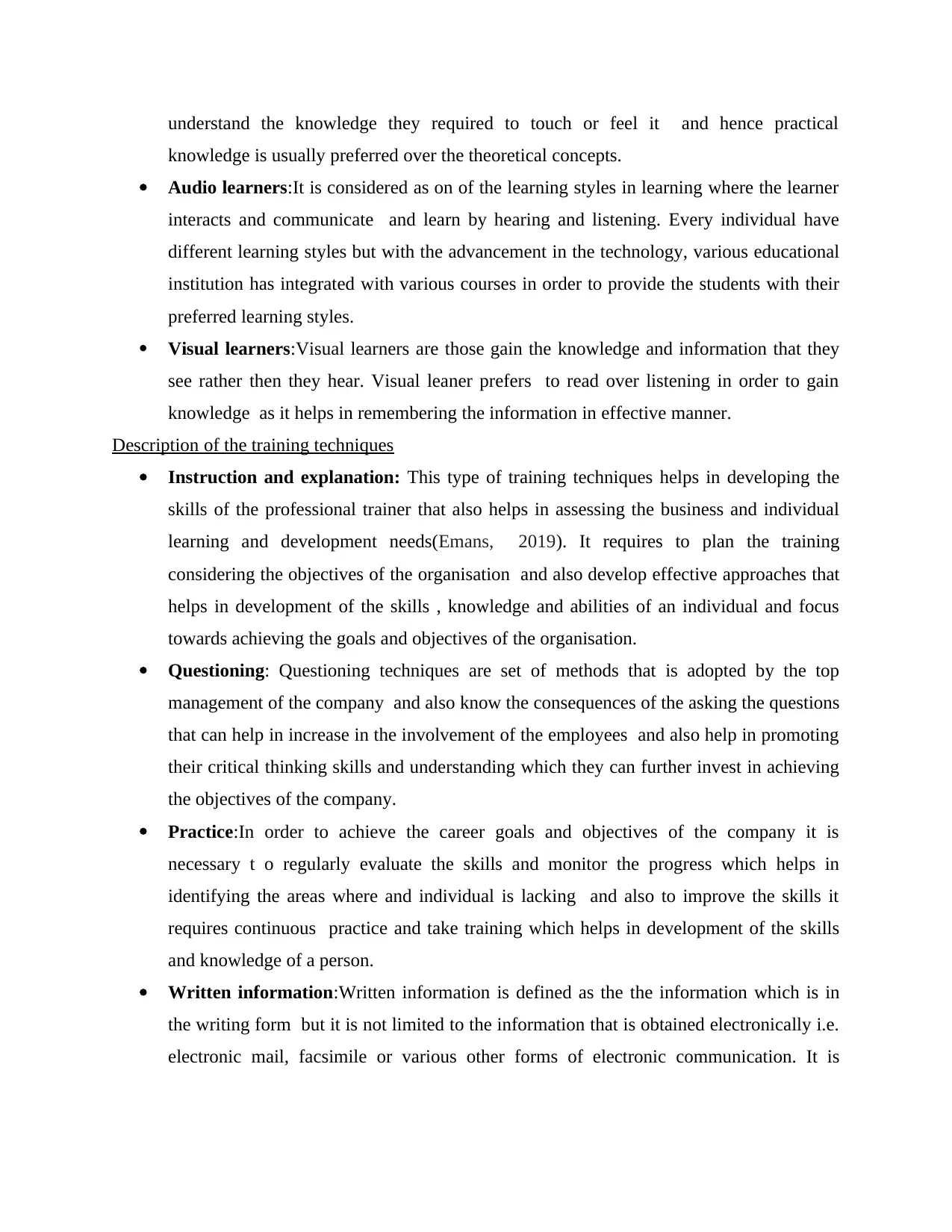
understand the knowledge they required to touch or feel it and hence practical
knowledge is usually preferred over the theoretical concepts.
Audio learners:It is considered as on of the learning styles in learning where the learner
interacts and communicate and learn by hearing and listening. Every individual have
different learning styles but with the advancement in the technology, various educational
institution has integrated with various courses in order to provide the students with their
preferred learning styles.
Visual learners:Visual learners are those gain the knowledge and information that they
see rather then they hear. Visual leaner prefers to read over listening in order to gain
knowledge as it helps in remembering the information in effective manner.
Description of the training techniques
Instruction and explanation: This type of training techniques helps in developing the
skills of the professional trainer that also helps in assessing the business and individual
learning and development needs(Emans, 2019). It requires to plan the training
considering the objectives of the organisation and also develop effective approaches that
helps in development of the skills , knowledge and abilities of an individual and focus
towards achieving the goals and objectives of the organisation.
Questioning: Questioning techniques are set of methods that is adopted by the top
management of the company and also know the consequences of the asking the questions
that can help in increase in the involvement of the employees and also help in promoting
their critical thinking skills and understanding which they can further invest in achieving
the objectives of the company.
Practice:In order to achieve the career goals and objectives of the company it is
necessary t o regularly evaluate the skills and monitor the progress which helps in
identifying the areas where and individual is lacking and also to improve the skills it
requires continuous practice and take training which helps in development of the skills
and knowledge of a person.
Written information:Written information is defined as the the information which is in
the writing form but it is not limited to the information that is obtained electronically i.e.
electronic mail, facsimile or various other forms of electronic communication. It is
knowledge is usually preferred over the theoretical concepts.
Audio learners:It is considered as on of the learning styles in learning where the learner
interacts and communicate and learn by hearing and listening. Every individual have
different learning styles but with the advancement in the technology, various educational
institution has integrated with various courses in order to provide the students with their
preferred learning styles.
Visual learners:Visual learners are those gain the knowledge and information that they
see rather then they hear. Visual leaner prefers to read over listening in order to gain
knowledge as it helps in remembering the information in effective manner.
Description of the training techniques
Instruction and explanation: This type of training techniques helps in developing the
skills of the professional trainer that also helps in assessing the business and individual
learning and development needs(Emans, 2019). It requires to plan the training
considering the objectives of the organisation and also develop effective approaches that
helps in development of the skills , knowledge and abilities of an individual and focus
towards achieving the goals and objectives of the organisation.
Questioning: Questioning techniques are set of methods that is adopted by the top
management of the company and also know the consequences of the asking the questions
that can help in increase in the involvement of the employees and also help in promoting
their critical thinking skills and understanding which they can further invest in achieving
the objectives of the company.
Practice:In order to achieve the career goals and objectives of the company it is
necessary t o regularly evaluate the skills and monitor the progress which helps in
identifying the areas where and individual is lacking and also to improve the skills it
requires continuous practice and take training which helps in development of the skills
and knowledge of a person.
Written information:Written information is defined as the the information which is in
the writing form but it is not limited to the information that is obtained electronically i.e.
electronic mail, facsimile or various other forms of electronic communication. It is
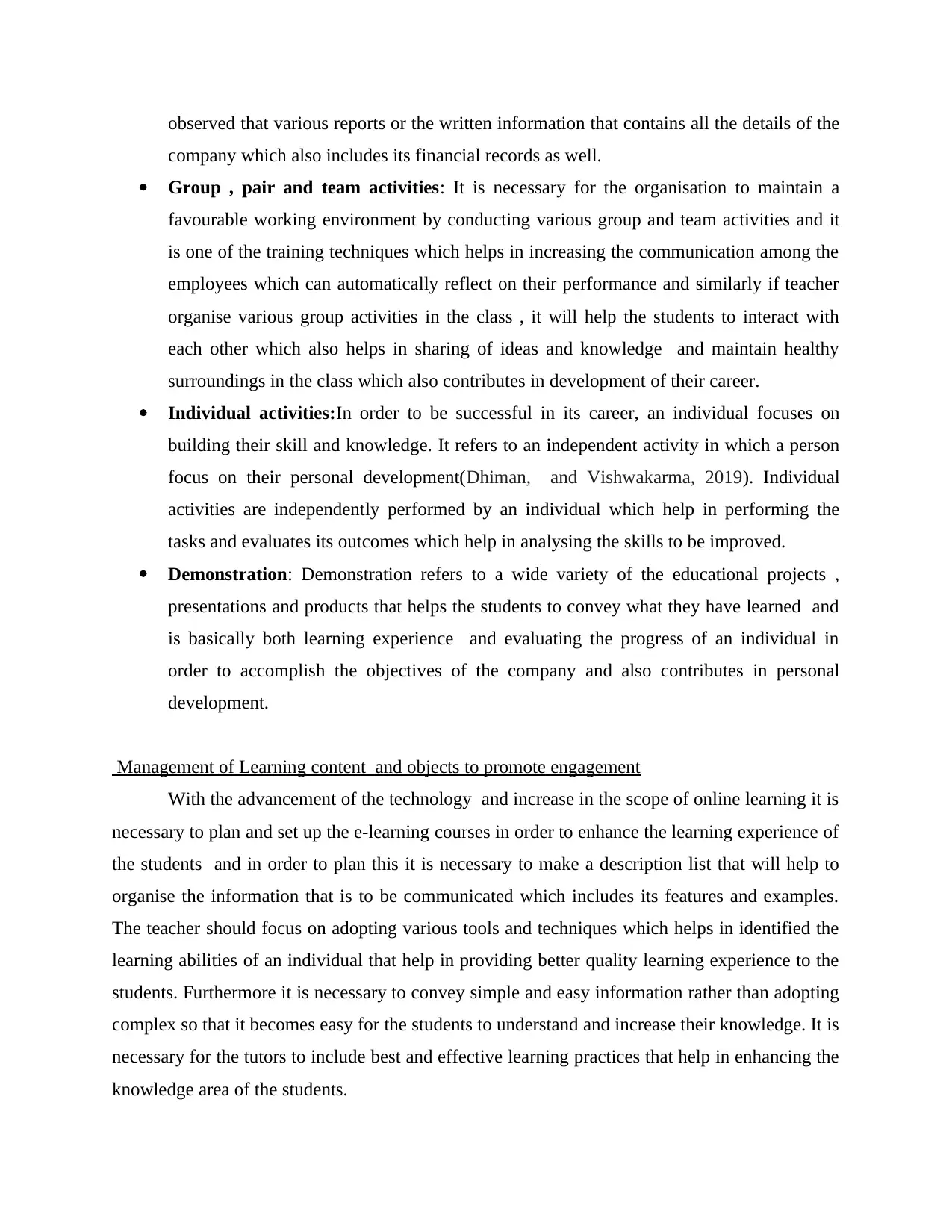
observed that various reports or the written information that contains all the details of the
company which also includes its financial records as well.
Group , pair and team activities: It is necessary for the organisation to maintain a
favourable working environment by conducting various group and team activities and it
is one of the training techniques which helps in increasing the communication among the
employees which can automatically reflect on their performance and similarly if teacher
organise various group activities in the class , it will help the students to interact with
each other which also helps in sharing of ideas and knowledge and maintain healthy
surroundings in the class which also contributes in development of their career.
Individual activities:In order to be successful in its career, an individual focuses on
building their skill and knowledge. It refers to an independent activity in which a person
focus on their personal development(Dhiman, and Vishwakarma, 2019). Individual
activities are independently performed by an individual which help in performing the
tasks and evaluates its outcomes which help in analysing the skills to be improved.
Demonstration: Demonstration refers to a wide variety of the educational projects ,
presentations and products that helps the students to convey what they have learned and
is basically both learning experience and evaluating the progress of an individual in
order to accomplish the objectives of the company and also contributes in personal
development.
Management of Learning content and objects to promote engagement
With the advancement of the technology and increase in the scope of online learning it is
necessary to plan and set up the e-learning courses in order to enhance the learning experience of
the students and in order to plan this it is necessary to make a description list that will help to
organise the information that is to be communicated which includes its features and examples.
The teacher should focus on adopting various tools and techniques which helps in identified the
learning abilities of an individual that help in providing better quality learning experience to the
students. Furthermore it is necessary to convey simple and easy information rather than adopting
complex so that it becomes easy for the students to understand and increase their knowledge. It is
necessary for the tutors to include best and effective learning practices that help in enhancing the
knowledge area of the students.
company which also includes its financial records as well.
Group , pair and team activities: It is necessary for the organisation to maintain a
favourable working environment by conducting various group and team activities and it
is one of the training techniques which helps in increasing the communication among the
employees which can automatically reflect on their performance and similarly if teacher
organise various group activities in the class , it will help the students to interact with
each other which also helps in sharing of ideas and knowledge and maintain healthy
surroundings in the class which also contributes in development of their career.
Individual activities:In order to be successful in its career, an individual focuses on
building their skill and knowledge. It refers to an independent activity in which a person
focus on their personal development(Dhiman, and Vishwakarma, 2019). Individual
activities are independently performed by an individual which help in performing the
tasks and evaluates its outcomes which help in analysing the skills to be improved.
Demonstration: Demonstration refers to a wide variety of the educational projects ,
presentations and products that helps the students to convey what they have learned and
is basically both learning experience and evaluating the progress of an individual in
order to accomplish the objectives of the company and also contributes in personal
development.
Management of Learning content and objects to promote engagement
With the advancement of the technology and increase in the scope of online learning it is
necessary to plan and set up the e-learning courses in order to enhance the learning experience of
the students and in order to plan this it is necessary to make a description list that will help to
organise the information that is to be communicated which includes its features and examples.
The teacher should focus on adopting various tools and techniques which helps in identified the
learning abilities of an individual that help in providing better quality learning experience to the
students. Furthermore it is necessary to convey simple and easy information rather than adopting
complex so that it becomes easy for the students to understand and increase their knowledge. It is
necessary for the tutors to include best and effective learning practices that help in enhancing the
knowledge area of the students.
⊘ This is a preview!⊘
Do you want full access?
Subscribe today to unlock all pages.

Trusted by 1+ million students worldwide
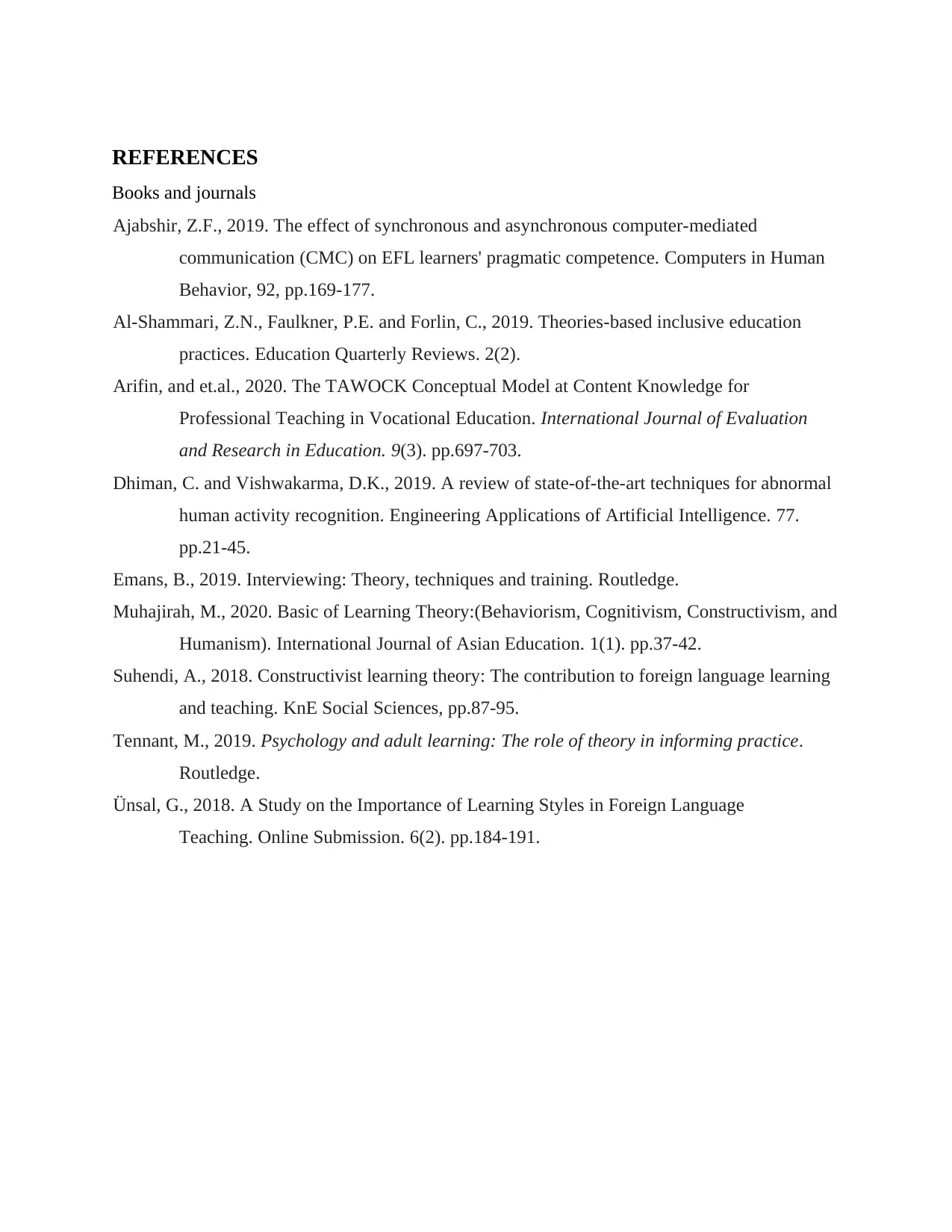
REFERENCES
Books and journals
Ajabshir, Z.F., 2019. The effect of synchronous and asynchronous computer-mediated
communication (CMC) on EFL learners' pragmatic competence. Computers in Human
Behavior, 92, pp.169-177.
Al-Shammari, Z.N., Faulkner, P.E. and Forlin, C., 2019. Theories-based inclusive education
practices. Education Quarterly Reviews. 2(2).
Arifin, and et.al., 2020. The TAWOCK Conceptual Model at Content Knowledge for
Professional Teaching in Vocational Education. International Journal of Evaluation
and Research in Education. 9(3). pp.697-703.
Dhiman, C. and Vishwakarma, D.K., 2019. A review of state-of-the-art techniques for abnormal
human activity recognition. Engineering Applications of Artificial Intelligence. 77.
pp.21-45.
Emans, B., 2019. Interviewing: Theory, techniques and training. Routledge.
Muhajirah, M., 2020. Basic of Learning Theory:(Behaviorism, Cognitivism, Constructivism, and
Humanism). International Journal of Asian Education. 1(1). pp.37-42.
Suhendi, A., 2018. Constructivist learning theory: The contribution to foreign language learning
and teaching. KnE Social Sciences, pp.87-95.
Tennant, M., 2019. Psychology and adult learning: The role of theory in informing practice.
Routledge.
Ünsal, G., 2018. A Study on the Importance of Learning Styles in Foreign Language
Teaching. Online Submission. 6(2). pp.184-191.
Books and journals
Ajabshir, Z.F., 2019. The effect of synchronous and asynchronous computer-mediated
communication (CMC) on EFL learners' pragmatic competence. Computers in Human
Behavior, 92, pp.169-177.
Al-Shammari, Z.N., Faulkner, P.E. and Forlin, C., 2019. Theories-based inclusive education
practices. Education Quarterly Reviews. 2(2).
Arifin, and et.al., 2020. The TAWOCK Conceptual Model at Content Knowledge for
Professional Teaching in Vocational Education. International Journal of Evaluation
and Research in Education. 9(3). pp.697-703.
Dhiman, C. and Vishwakarma, D.K., 2019. A review of state-of-the-art techniques for abnormal
human activity recognition. Engineering Applications of Artificial Intelligence. 77.
pp.21-45.
Emans, B., 2019. Interviewing: Theory, techniques and training. Routledge.
Muhajirah, M., 2020. Basic of Learning Theory:(Behaviorism, Cognitivism, Constructivism, and
Humanism). International Journal of Asian Education. 1(1). pp.37-42.
Suhendi, A., 2018. Constructivist learning theory: The contribution to foreign language learning
and teaching. KnE Social Sciences, pp.87-95.
Tennant, M., 2019. Psychology and adult learning: The role of theory in informing practice.
Routledge.
Ünsal, G., 2018. A Study on the Importance of Learning Styles in Foreign Language
Teaching. Online Submission. 6(2). pp.184-191.
Paraphrase This Document
Need a fresh take? Get an instant paraphrase of this document with our AI Paraphraser

1 out of 8
Related Documents
Your All-in-One AI-Powered Toolkit for Academic Success.
+13062052269
info@desklib.com
Available 24*7 on WhatsApp / Email
![[object Object]](/_next/static/media/star-bottom.7253800d.svg)
Unlock your academic potential
Copyright © 2020–2026 A2Z Services. All Rights Reserved. Developed and managed by ZUCOL.




